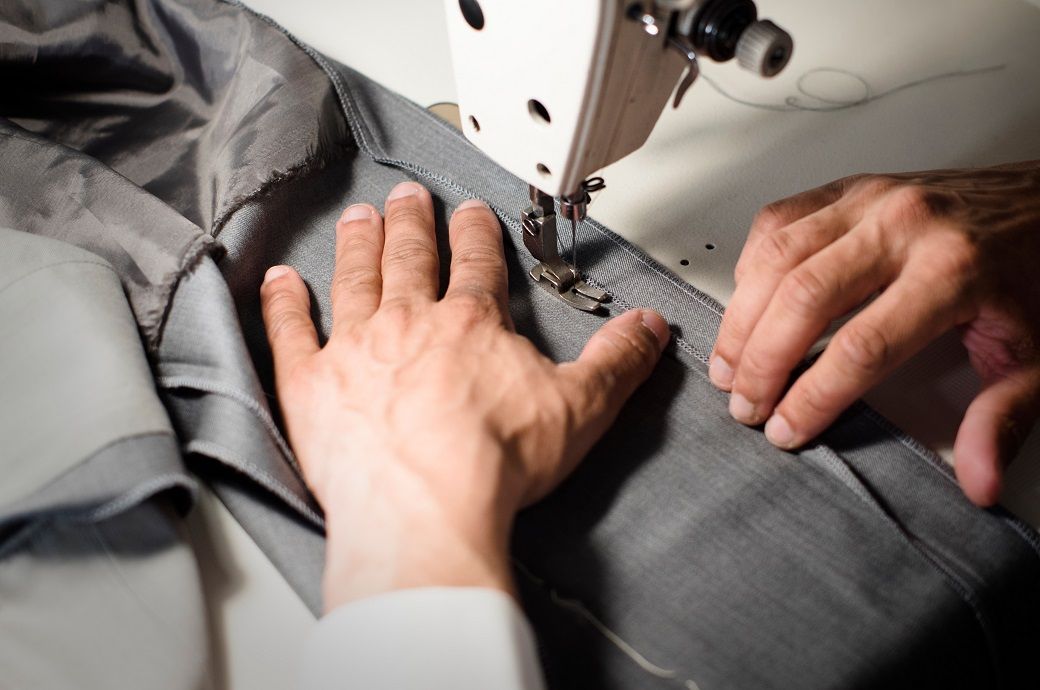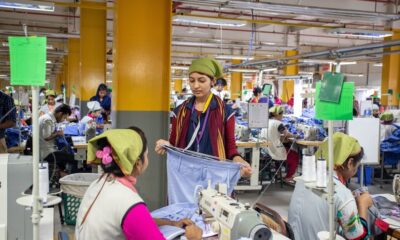Fashion
US tariff blow puts Indian MSMEs on the brink

The United States’ decision to impose an additional 25 per cent tariff on Indian imports, raising the total duty to 50 per cent, is sending shockwaves through India’s business landscape.
The US’ imposition of 25 per cent additional tariff on Indian imports has raised the total duty to 50 per cent, creating deep uncertainty for the MSMEs.
As per reports, Panipat and Ludhiana are amongst the hardest hit by the US tariffs.
However, the latest media reports suggest the government is now planning dedicated outreach programmes in 40 countries to counter the steep US tariffs.
Reports indicate nearly 50 per cent of India’s exports to the United States, valued at around $87.3 billion, will face the steep 50 per cent tariff. This will significantly impact the key sectors, including textiles and apparel, gems and jewellery, seafood, and leather goods.
Meanwhile, analysts estimate a GDP reduction between 0.2 per cent and 1 per cent in FY26, with a potential economic contraction of $7 billion to $25 billion, depending on price adjustments and finding new markets while a CRISIL report highlighted that higher US tariffs will have a significant impact on India’s MSME sector, which accounts for approximately 45 per cent of the country’s total exports. Among the hardest hit will be textiles and gems & jewellery, which together make up an estimated 25 per cent of India’s exports to the US.
In cities like Panipat and Ludhiana — two major industrial hubs and home to a large number of MSMEs— the abrupt escalation of US tariffs has triggered a fresh wave of uncertainty, particularly among MSMEs, which form the backbone of the export economy.
Known as India’s “Textile City,” Panipat in Haryana is globally recognised for its production of yarn, home textiles, and recycled fabrics. However, since the imposition of the initial 25 per cent reciprocal tariff by the US, Panipat’s supply chains had been facing serious disruptions, and now, with the additional 25 per cent tariff coming into effect, the implications are going to be devastating expressed fears some industry stakeholders interacting with Fibre2Fashion.
Panipat’s yarn industry, which boasts an annual turnover of about ₹60,000 crore, relies on exports worth ₹20,000 crore — 60 per cent of which are destined for the US, as per some estimates. This makes the city one of the most exposed to Washington’s aggressive trade stance. Already strained by ongoing global crises such as the Russia-Ukraine conflict, high freight costs, and inflation in key international markets like Europe and South America, the industry is struggling to absorb yet another external shock.
For the city’s yarn spinners, exporters, and small-scale crafters, the implications are dire. Increased duties mean Indian products will be significantly less competitive in the US market. Order volumes are expected to drop drastically as American buyers seek cheaper alternatives in other countries. Local businesses, especially the smaller ones, are worried about payment delays, the spectre of cancelled contracts and mass layoffs.
Meanwhile, Ludhiana, an important export hub in the state of Punjab, is also said to be facing its own set of challenges. The city, which exports a wide range of goods including textiles, hosiery, auto parts, hand tools, and machinery, is said to be staring at a revenue loss of over ₹10,000 crore because of the US tariffs, as per some estimates.
According to reports, more than 300 companies in Ludhiana are directly engaged in trade with the American market, and the sudden cost escalation will only push them into crisis mode. With roughly ₹6,000 crore worth of textile and hosiery goods shipped annually to the US, as per some estimates, the stakes for Ludhiana’s manufacturers could not be higher.
The tariffs come at a time when exporters in Ludhiana are already under pressure from fluctuating demand, rising input costs, and stiff global competition. The industry now faces the grim prospect of large-scale order cancellations, job loss and even existential threat for some.
However, there now appears to be a glimmer of hope. According to the latest media reports, the Government is now planning dedicated outreach programmes in 40 countries to counter the steep US tariffs. The list reportedly includes key markets such as Australia, Belgium, Canada, France, Germany, Italy, Japan, Mexico, Poland, Russia, Spain, South Korea, Turkiye, the Netherlands, the United Arab Emirates, and the United Kingdom.
Experts have long emphasised that diversifying into new markets and exploring alternative geographies is crucial for survival, and with the Government’s active help, hopefully the industry is able to navigate its way out of the crisis soon.
Fibre2Fashion News Desk (DR)
Fashion
Interjeans portfolio continues to expand with heritage brand Belstaff

Published
January 16, 2026
New addition at Interjeans: following last year’s arrival of German athletic-luxury brand Bogner, the San Marino-based company in Rovereta, founded in 1992 by Andrea Belletti, is expanding its brand portfolio and has outlined its growth plans to FashionNetwork.com.
“Last November we signed a distribution agreement for the Italian market with Belstaff: a storied brand with motorcycling roots, founded in England in 1924, which I am sure will be a must-have once again. For 2026 we expect encouraging results, driven in particular by this addition,” said Belletti.
“As for Interjeans, we are not considering any company-owned stores beyond the one in Riccione,” the manager continued. “We remain true to our roots, focusing on distribution, but we would like to develop a shop-in-shop format with key customers that would allow us greater control over the product assortment, layout and communication. We are currently present with Lyle & Scott and Superdry in Rinascente and Coin, via concessions, but we would like to extend this format to include Belstaff as well,” Belletti continued.
Interjeans, which closed 2025 with turnover of €39 million, distributes in Italy the brands G-Star Raw, Lyle & Scott, Dr Denim, Karl Lagerfeld (three lines), Bogner, O’Neill, the Greek womenswear brand BSB, and Superdry.
Julian Dunkerton, CEO of the British clothing brand he founded in 2003 in Cheltenham—a label that blends American preppy-vintage style with English elegance—presented the new Superdry collection. It stands out for its clean lines, perfect balance and refined functionality.
Speaking to FashionNetwork.com, the entrepreneur revealed he is very pleased with the results achieved after a major reorganisation.
Dunkerton described it as a “massive shake-up” that has returned the company to profit.
“We have worked hard on the collections and distribution, reviewed the structure, and delisted from the stock market. Today, I feel we are on the right path: there is consistency and a clear awareness of who we are. Our presence at Pitti is fundamental; it is the most important international event in the industry and for us it truly represents the place to be. Next year, I would like to double the size of our space and bring our womenswear offer to Florence as well, which now accounts for 50 per cent of the total. In addition, we plan to open 24 Superdry stores in 2026 with a completely revamped store format that emphasises our British heritage and offers a lighter, brighter, higher-quality aesthetic. We will operate through both franchise agreements and direct management, predominantly in the UK,” concluded the Superdry founder.
This article is an automatic translation.
Click here to read the original article.
Copyright © 2026 FashionNetwork.com All rights reserved.
Fashion
At Balenciaga, Pierpaolo Piccioli pushes the boundaries between sport and tailoring

Published
January 16, 2026
Pierpaolo Piccioli seems intent on exploring how far the relationship between sport and tailoring can be pushed. On Thursday, the French fashion house unveiled and launched for sale, on its website and in its boutiques, a collaboration with the NBA, the U.S. basketball league. At the same time, ahead of the Milan and Paris Fashion Weeks, it presented its lookbook for Autumn 2026.
“I believe that sport is one of the most powerful ways of expressing values such as excellence, integrity and respect. On a pitch or court, people from different backgrounds, cultures and abilities come together under the same rules and with the same goals,” said the creative director of the Kering group house, in a press release.
“This shared space creates a heightened sense of connection and focus, reminding us of the discipline, commitment and intensity that define sport at its highest level.”
For the NBA line, that commitment is expressed through key sportswear pieces reinterpreted in materials such as leather, satin, cotton poplin and Japanese denim, and, in addition to black, in the NBA’s historic colours: red, blue and white. The brand adopts sporting codes by marking T-shirts and coach jackets with the number 10, a nod to the address of its headquarters on Avenue George V in Paris, or with a stylised “B” on the back or over the heart.
But sport permeates the Balenciaga universe well beyond this. The brand’s Autumn 2026 proposal, captured in the streets and métro of Paris by photographer Robin Galiegue, explores the potential of imposing tailored pieces, echoing the house’s past designs, such as cashmere capes and neo-gazar coats, which the creative director is working to revive.

Today, Piccioli goes further and pairs them with techwear pieces. Heavy wool coats and oversized leather jackets are worn over a shorts-and-leggings duo crafted from Probody fabric, which offers moisture-wicking, breathability and antibacterial properties. In the age of wellbeing, this trend runs through most of the looks in the Autumn 2026 collection.
The designer has not forgotten the importance of accessories, either. While these creations are designed for training or yoga, they are also accompanied by a new bag model, the 7, patinated crystal jewellery and exceptional shoes from a collaboration with Manolo Blahnik.
This article is an automatic translation.
Click here to read the original article.
Copyright © 2026 FashionNetwork.com All rights reserved.
Fashion
Xreal files patent suit against rival smart glasses maker Viture

By
Bloomberg
Published
January 15, 2026
Xreal Inc., a Chinese pioneer in smart glasses, is suing Viture Inc. for patent infringement in the US, arguing its rival has unfairly capitalized on Xreal’s extensive research and investment in the segment.
The lawsuit, filed Thursday in federal court in eastern Texas, accuses San Francisco-founded Viture of unlawfully incorporating Xreal’s patented inventions into smart glasses such as the Luma Pro, Luma Ultra, and a high-end pair called The Beast.
Both Xreal and Viture manufacture augmented reality, or AR, glasses that plug into devices like smartphones and laptops, offering viewers a large virtual display for watching movies or handling productivity tasks. Technical specifications like display resolution and field of view- the size of the augmented world you can see at any given time- are often very similar between the two brands.
Their US legal battle comes ahead of what is expected to be a pivotal moment for the segment, with Apple Inc. expected to make its category debut as soon as this year, Bloomberg has reported.
Xreal holds over 800 patent and patent applications worldwide, including dozens in the US and Europe, it said in a statement Thursday announcing the lawsuit. “By comparison, Viture owns approximately or fewer than 70 patent and patent applications globally, with none in the United States or Europe,” it added.
“The lawsuit is not merely about enforcing a single patent,” Xreal said in the statement. “It is about stopping a pattern of intellectual property infringement that undermines the integrity of innovation and endangers continued technological development in this industry.”
Xreal holds more global market share than Viture in the AR eyewear category, according to research firm IDC. But both companies lag far behind Meta Platforms Inc., which has come the closest to mainstream success with its Ray-Ban line of smart glasses.
At the CES technology trade show earlier this month, Xreal unveiled a new entry-level pair of glasses and a co-branded set of glasses developed with Taiwan’s Asustek Computer Inc. It also announced that it’s extending a partnership with Alphabet Inc.’s Google.
Xreal said in the statement that these and other collaborators are “owed confidence that their co-developed products will not also be threatened by infringers attempting to benefit from infringement or undermined by unauthorized usage of IP.”
-

 Politics1 week ago
Politics1 week agoUK says provided assistance in US-led tanker seizure
-

 Entertainment1 week ago
Entertainment1 week agoDoes new US food pyramid put too much steak on your plate?
-

 Entertainment1 week ago
Entertainment1 week agoWhy did Nick Reiner’s lawyer Alan Jackson withdraw from case?
-

 Business1 week ago
Business1 week agoTrump moves to ban home purchases by institutional investors
-

 Sports5 days ago
Sports5 days agoClock is ticking for Frank at Spurs, with dwindling evidence he deserves extra time
-

 Sports1 week ago
Sports1 week agoPGA of America CEO steps down after one year to take care of mother and mother-in-law
-

 Business1 week ago
Business1 week agoBulls dominate as KSE-100 breaks past 186,000 mark – SUCH TV
-

 Tech3 days ago
Tech3 days agoNew Proposed Legislation Would Let Self-Driving Cars Operate in New York State


















